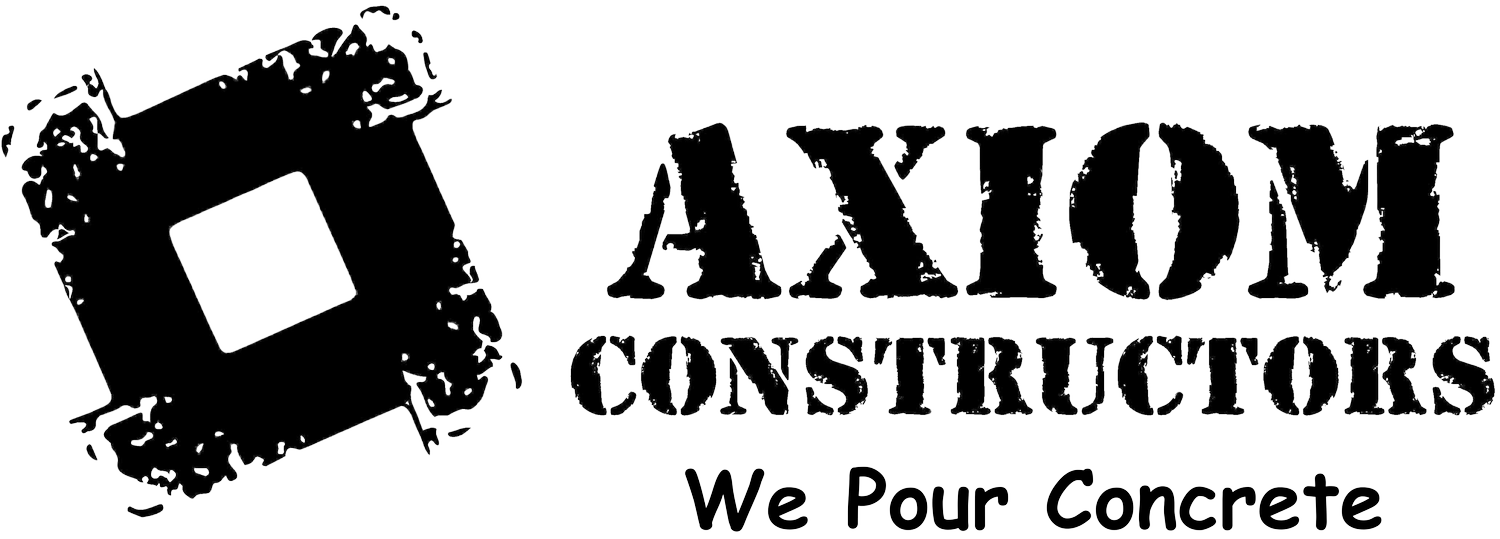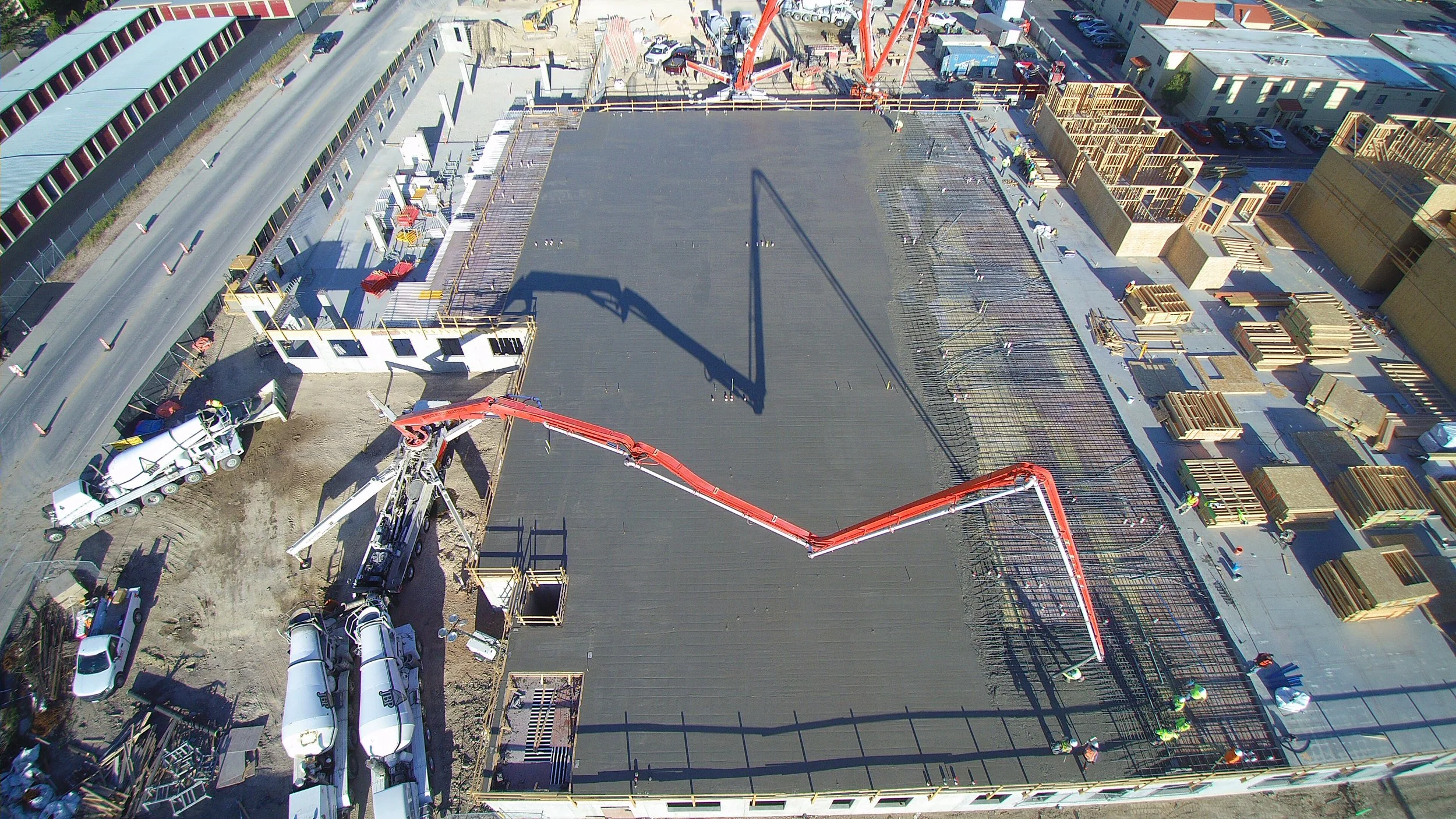Constructing your vision.
At Axiom, we have the knowledge and experience to bring your vision to life from early project conception through a final product that exceeds your expectations. Whether you’re looking for formwork only or complete turnkey services, we can provide you with quality work, highly skilled personnel, and innovative solutions.
OUR SERVICES
Concrete Construction
We take pride in offering our clients exceptional professionalism and top-notch craftsmanship at competitive prices. We focus on building lasting relationships with our clients through transparent communication and unmatched customer service.
-
PT Podiums, short for Post-Tensioned Podiums, are specialized structural slabs most commonly used in mixed-use buildings where a concrete platform supports one or more levels of light-framed superstructure (like wood or steel). Here are the main ways PT Podiums are used and the benefits they provide:
Mixed-Use Construction: PT podium slabs create a horizontal separation between residential units (like apartments or condos) above and commercial or parking spaces below. This allows for large open areas without columns for retail stores, lobbies, or parking garages, while still supporting multiple floors of living or office space above.
Long-Span Floor Systems: PT podiums excel where wide, uninterrupted spans (such as those needed for parking or retail) are required. PT technology lets the podium slabs be thinner and span farther with fewer supporting columns than conventional reinforced concrete, maximizing usable space below.
Structural Load Transfer: The PT podium acts as a transfer slab, distributing the loads from the upper structure (like wood framing) down to the foundation or lower columns, allowing for flexibility in how the building is laid out above versus below.
Crack and Deflection Control: Post-tensioning provides pre-compression to the concrete slab, which helps minimize cracking and controls long-term deflections. This improves the durability and performance of the podium slab under heavy gravity loads from above.
Design Flexibility: PT podiums allow for different column layouts above and below, accommodating open amenity spaces, courtyards, or changes in building function between floors. This is especially valuable for creating vibrant mixed-use developments.
Efficient Construction: PT podiums require less reinforcing steel overall and a thinner slab for the same performance, leading to faster construction times and cost savings on material and labor, especially for longer spans.
In summary, PT podiums are favored in modern construction for their ability to efficiently support heavy and complex mixed-use structures, optimize space, and provide both design flexibility and cost benefits.
-
Government Offices: These buildings house administrative offices and departments responsible for implementing government policies.
Courthouses: Designed to host judicial proceedings, including courtrooms, judges' chambers, and legal offices.
City Hall or Town Hall: These buildings serve as the headquarters for local government.
Military bases: Includes barracks, command centers, training facilities, and other structures.
Prisons and Correctional Facilities: These buildings are designed for the incarceration and rehabilitation of individuals who have committed crimes.
Public Libraries: While not exclusively government buildings, public libraries are often government-funded and provide essential educational resources to the community.
Public Safety Buildings: Buildings that house police and fire departments, emergency response centers, and other public safety agencies.
-
Industrial Warehouses: This method allows for the quick and cost-effective construction of expansive spaces used for storage, manufacturing, or distribution.
Office Buildings: This approach combines the efficiency of tilt-up construction with the design flexibility required for office spaces.
Retail Centers: Tilt-up construction is applied to create retail buildings, including shopping centers and standalone stores.
Educational Facilities: Tilt-up buildings can be used for schools, universities, and other educational structures.
Data Centers: The method allows for the quick erection of robust structures capable of meeting specific technical requirements.
Distribution Centers: The method enables the construction of facilities optimized for efficient storage and distribution operations.
Medical Facilities: Tilt-up buildings can be utilized for medical offices, clinics, and healthcare facilities.
Automotive Dealerships: Tilt-up construction is applied to create showrooms and service centers for automotive dealerships.
Recreational Facilities: Tilt-up buildings can be used for recreational structures, such as gyms and sports complexes.
Cold Storage Facilities: The method provides a durable and efficient solution for constructing refrigerated or frozen storage spaces.
-
Residential Developments: Includes single-family homes, apartment complexes, condominiums, and townhouses.
Commercial Developments: Includes office buildings, retail centers, malls, and hotels.
Industrial Developments: May include warehouses, factories, and industrial parks.
Mixed-Use Developments: A blend of residential, commercial, and sometimes industrial components that creates a comprehensive community.
Retail Developments: Includes shopping centers, strip malls, and standalone retail stores.
Office Parks: A grouping of buildings that provide office spaces for businesses and organizations.
Hotel and Hospitality Developments: Includes hotels, resorts, and other hospitality-oriented facilities.
Educational Developments: Includes schools, colleges, and universities.
Healthcare Developments: Includes hospitals, medical offices, and healthcare campuses.
Green or Sustainable Developments: Incorporates energy-efficient designs, green spaces, and eco-friendly technologies.
Senior Living Developments: Includes retirement communities, assisted living facilities, and nursing homes.
Sports and Recreation Developments: Includes stadiums, arenas, golf courses, and recreational complexes.
Entertainment Developments: Includes theaters, concert halls, amusement parks, and entertainment complexes.
-
Transportation Construction: Involves the construction of transportation infrastructure such as roads, highways, bridges, tunnels, and railways.
Water and Wastewater Construction: Encompasses the development of water supply systems, sewage treatment plants, dams, and irrigation projects.
Environmental Construction: Includes the construction of landfills, environmental remediation, and pollution control facilities.
Utility Construction: Involves the installation and maintenance of utility systems such as water, gas, electricity, and telecommunications.
Structural Construction: The construction of dams, airports, ports, and other major infrastructure projects.
Bridge Construction: Includes various types such as beam, arch, suspension, and cable-stayed bridges.
Renewable Energy Construction: Involves the construction of renewable energy facilities such as wind farms, solar farms, and hydropower plants.
Industrial Construction: Pertains to the construction of industrial facilities, factories, and manufacturing plants.
-
Manufacturing Plants: These plants often house machinery, assembly lines, and specialized areas for manufacturing processes.
Warehouses: Warehouses can be general-purpose or specialized for specific types of products, such as cold storage warehouses.
Distribution Centers: Facilities that serve as hubs for the distribution of goods to retailers, wholesalers, or directly to consumers.
Processing Plants: Includes food processing plants, chemical processing facilities, and refineries.
Assembly Plants: Common in industries such as automotive manufacturing and electronics assembly.
Research and Development (R&D) Centers: These buildings often house laboratories and specialized testing equipment.
Chemical Plants: Includes petrochemical plants, pharmaceutical manufacturing, and specialty chemical production.
Food and Beverage Processing Plants: Includes meat processing plants, breweries, and dairy processing facilities.
Aerospace Manufacturing Plants: Includes assembly lines, hangars, and testing facilities.
-
Site Paving: Concrete is used for site paving to create durable surfaces for roads, sidewalks, driveways, and parking lots.
Curbs and Gutters: Concrete curbs and gutters are used for effective stormwater management and to delineate roadways and sidewalks.
Retaining Walls: Concrete retaining walls are structures designed to hold back soil and prevent erosion.
Bollards and Barriers: Concrete bollards and barriers are installed for safety and security.
Site Amenities: Concrete is used to create site amenities such as benches, planters, and decorative features.
Utility Pads: Concrete utility pads provide stable platforms for the installation of equipment, transformers, or other utility-related structures.
Ramps and Walkways: Concrete is often used to construct ramps and walkways for accessibility.
Slipform Construction: In slipform construction, continuous concrete placement allows for the seamless creation of vertical structures like curbs, barriers, or walls.
HOW IT WORKS
Fill out the form: To get started, please fill out the form to tell us about your project and what you’re looking for. One of our team members will get in touch with you soon to set up a complimentary consultation.
Get a quote: After our consultation, we’ll provide you with a complete and accurate proposal.
Schedule your project: Confirm the details of your project and schedule your appointment.
Get it done: Relax as our team handles the entire process from delivery and execution to clean up.


